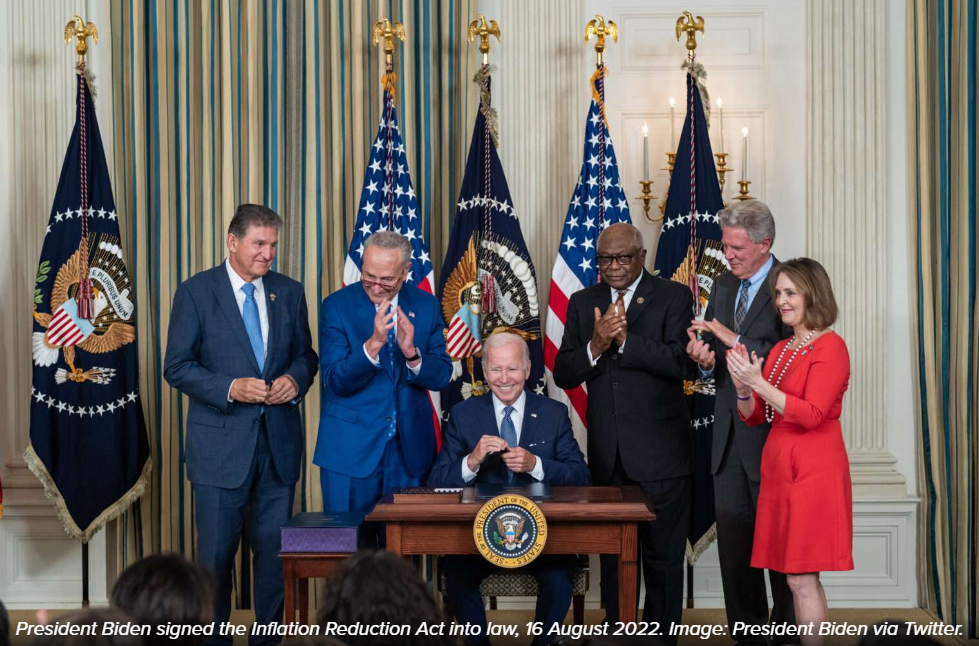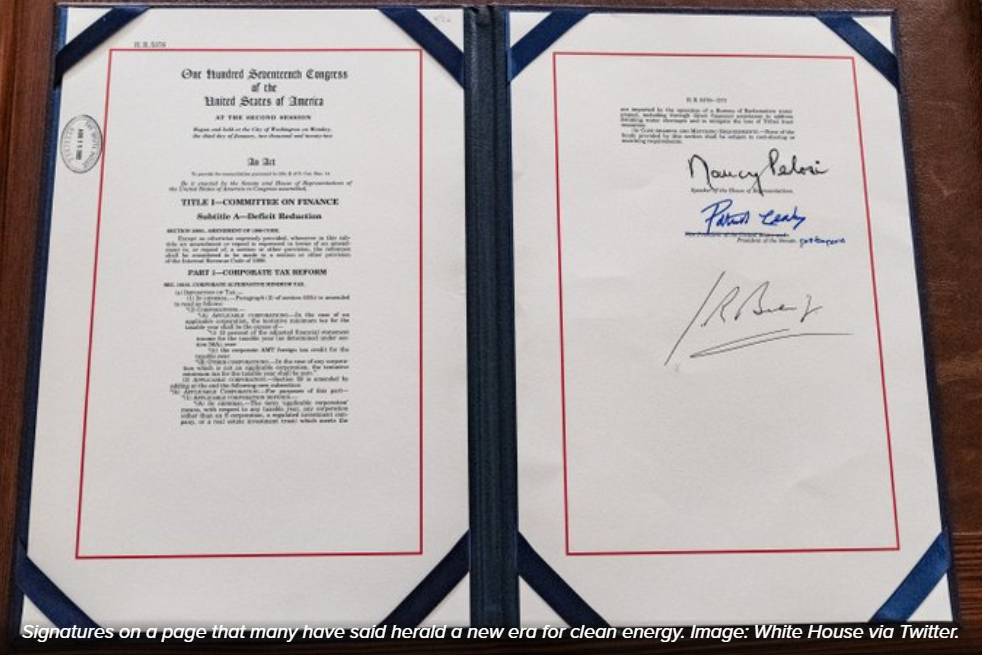By Andy Colthorpe
View the original article here

US President Joe Biden signed the Inflation Reduction Act yesterday, bringing with it tax incentives and other measures widely expected to significantly boost prospects for energy storage deployment.
“The Inflation Reduction Act invests US$369 billion to take the most aggressive action ever — ever, ever, ever — in confronting the climate crisis and strengthening our economic — our energy security,” Biden said.
The legislation was readied for Biden’s signature at a speed which took many by surprise, from the announcement of compromises being reached by West Virginia Senator Joe Manchin and Senate Majority Leader Chuck Schumer at the end of July, to its quick passing in the Senate and then the House of Representatives in just over a fortnight.
Its investment in energy security and climate change mitigation targets a 40% reduction in greenhouse gas (GHG) levels by 2030, supporting electric vehicles (EVs), energy efficiency and building electrification, wind, solar PV, green hydrogen, battery storage and other technologies.
Most directly relevant to the downstream energy storage industry is the introduction of an investment tax credit (ITC) for standalone energy storage. That can lower the capital cost of equipment by about 30%, although under some prevailing conditions it will be more or less, depending on, for example, use of local unionised labour.
It also unties developers from pursuing a disproportionately high percentage of solar-plus-storage hybrid projects, since prior to the act, batteries were eligible for the ITC, but only if they charged directly from the solar for at least 70% of every year in operation. The industry has campaigned for the standalone ITC for many years.
For the upstream battery and energy storage system value chains, there are also tax incentives for siting production within the US, as there are for wind and solar PV equipment manufacturers that source components or make their products domestically.
There are also 10-year extensions to existing wind and solar ITCs along with new or extended clean energy production tax credits (PTCs) and the ITC for solar goes up from 26% to 30%, while the standalone storage ITC will also be in place for the next decade.
There are also provisions that community solar installations where at least 50% of customers live in low to moderate income communities can prevail of an extra 20% ITC, and an extra 10% ITC for projects built with at least 40% domestic content, rising to a 55% threshold in 2027.
Interconnection costs are also included in ITC-eligible project costs.
Incentives will scale down by small increments every couple of years but could be further extended if targeted emissions reductions are not achieved in that timeframe.
As might be expected, many companies and commentators across the industry had plenty to say on the act becoming law with the stroke of Biden’s pen. Here are a few of their comments:
American Clean Power Association
National trade association representing clean energy companies, since last year merged with the national Energy Storage Association
“This does for climate change and clean energy what the creation of Social Security did for America’s senior citizens. This law will put millions more Americans to work, ensure clean, renewable and reliable domestic energy is powering every American home, and save American consumers money.
For our industry, it’s the starting gun for a period of regulatory certainty which will triple the size of the US clean energy industry and generate over US$900 billion in economic activity through construction of new clean energy projects,” Heather Zichal, CEO.
Stem Inc
Provider of standalone storage and solar-plus-storage solutions to behind-the-meter commercial and industrial (C&I) and distributed front-of-meter market segments
“…we view the investments in clean energy within the Inflation Reduction Act as transformational for our country, the energy industry, and our company as we continue to accelerate the clean energy transition.
For customers deploying energy storage and solar, the most significant parts of the bill are tax credits for clean electricity investment and production. We anticipate that these incentives will increase investment certainty and make adoption more affordable in existing and new energy markets,” John Carrington, CEO
LDES Council
Trade association representing technology providers and large end-users for long-duration energy storage (LDES)
“The passing of the landmark Inflation Reduction Act is a critical win for long-duration energy storage technologies. This historical act enables energy storage to accelerate to the scale we need by levelling the playing field for all types of storage. LDES improves grid reliability, resiliency, and flexibility around renewable energy sources like wind and solar, and has the ability to standalone [sic] and contribute increased stability to the grid,” Julia Souder, executive director.
Stryten Energy
US-based provider of vanadium redox flow battery (VRFB) solutions
“Stryten Energy welcomes this legislation’s long-term, standalone energy storage investment tax credits and its ten-year runway, which will help our customers incorporate medium and long-duration energy storage such as VFRB batteries into their operations more economically than before.
Leveraging domestic VFRB technology and other long-term energy storage solutions will enable reliable access to clean power and help the U.S. achieve energy security as it transitions to a clean energy economy,” Tim Vargo, CEO.
KORE Power
Manufacturer of battery cells, racks and complete systems, serving the energy storage system (ESS) and electric mobility infrastructure sectors
“The clean energy provisions in the Act prioritise scaling the domestic clean energy ecosystem, renewing our focus on raw material production and manufacturing, and catalysing the maturation of the nation’s domestic supply chain. It will position domestic suppliers to meet the demands of decarbonisation in the energy and transportation sectors.
As a lithium-ion battery cell manufacturer building a gigafactory outside Phoenix, we look forward to accelerating the growth of an end-to-end battery supply chain by delivering American IP built by American workers with recyclable North American materials to power e-mobility and energy storage solutions.
As a partner to suppliers, end users, and recyclers, we are most excited that the Act will expand access to the jobs needed to realize these goals and will rapidly expand the benefits that modern electrification and energy storage offer our economy, our customers and communities,” Lyndsay Gorrill, CEO.

International Zinc Association
Trade association representing zinc production and related companies, including a subsidiary trade group, Zinc Battery Initiative
“The International Zinc Association (IZA) applauds the passage of the Inflation Reduction Act of 2022 for bringing critical focus and funding to the cleantech space. This unprecedented climate legislation will promote the production of critical minerals required for batteries as well as the manufacture and purchase of energy storage, such as rechargeable zinc batteries. IZA members are proud to provide safe, sustainable options for the energy storage industries, an essential part of the clean energy transition,” Andrew Green, executive director.
Center for Sustainable Energy
National clean energy non-profit group
“These tax credits and incentives will spur increased manufacturing and adoption of clean technologies by all Americans, including people with low and moderate incomes and communities that have borne the brunt of pollution. We’re investing in climate solutions – including energy-efficient, all-electric homes; rooftop solar; energy storage; and electric vehicles,” Lawrence Goldenhersh, president.
Howden
Provider of mission-critical air and gas handling products
“The very generous tax credits, up to US$3/kg for 10 years, will make the renewable H2 produced in the US the cheapest form of hydrogen in the world.
“There is no doubt that this step will accelerate progress in the global hydrogen market, and more and more countries and organisations will now start speeding up their plans to become major players in this growing sector,” Salah Mahdy, global director of renewable hydrogen.
No doubt, there will be much more to follow on this topic…
